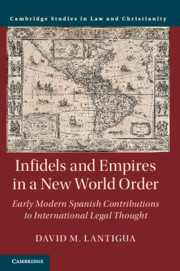 Infidels and Empires in a New World Order
Infidels and Empires in a New World Order from Part I - The New World Crucible of Infidel Rights
Published online by Cambridge University Press: 11 June 2020
The culmination of the clash between two conceptions of infidel dominium and world order expressed itself most dramatically at the Valladolid junta of the Spanish imperial court. This debate put on perspicuous display two opposed ethics of evangelization embedded in the theology and canon law of the Latin West: an apostolic method of peaceful preaching and a coercive method of missionary war. Las Casas and Sepúlveda, respectively, took up these two approaches with startling results. Drawing on biblical and theological legal sources, both deployed natural law and the law of nations to advance their political arguments concerning Christian-infidel relations, thus signaling the ambivalent ideological tone of international relations in the West. Whereas Sepúlveda defended the justice of Spanish imperial dispossession of native peoples through war, Las Casas radically accounted for Amerindian claims of just war against European aggressors. By turning to Valladolid in depth, the unique scholastic theological and juristic contributions of Las Casas and the Spanish Dominicans appear with greater salience for international legal thought. Additionally, the understated ideological vestiges of Sepúlveda’s Spanish imperial humanism for early modern and modern European expansion also come into sharp relief.
To save this book to your Kindle, first ensure [email protected] is added to your Approved Personal Document E-mail List under your Personal Document Settings on the Manage Your Content and Devices page of your Amazon account. Then enter the ‘name’ part of your Kindle email address below. Find out more about saving to your Kindle.
Note you can select to save to either the @free.kindle.com or @kindle.com variations. ‘@free.kindle.com’ emails are free but can only be saved to your device when it is connected to wi-fi. ‘@kindle.com’ emails can be delivered even when you are not connected to wi-fi, but note that service fees apply.
Find out more about the Kindle Personal Document Service.
To save content items to your account, please confirm that you agree to abide by our usage policies. If this is the first time you use this feature, you will be asked to authorise Cambridge Core to connect with your account. Find out more about saving content to Dropbox.
To save content items to your account, please confirm that you agree to abide by our usage policies. If this is the first time you use this feature, you will be asked to authorise Cambridge Core to connect with your account. Find out more about saving content to Google Drive.